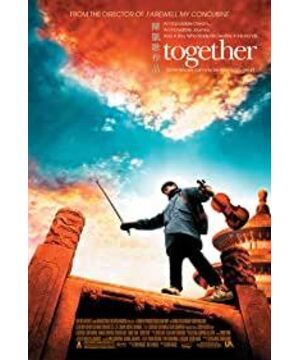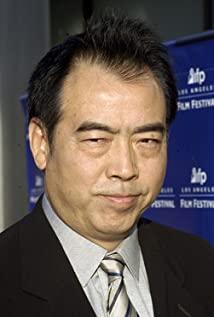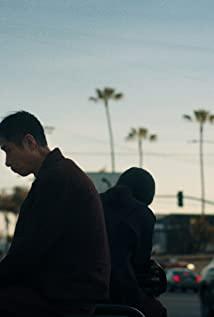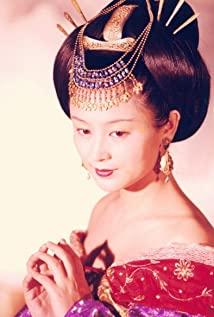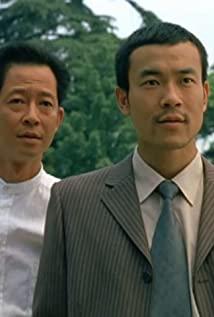"Together" (Together): Abstract music under figurative images
(Text: Vulcan Ji)
Abstract music can be fully expressed in figurative lens language. As far as my musical literacy is concerned, most of the emotions expressed by most of the music in this film can't be understood by me. That flamboyant performance of the uncrowned king suddenly moved me—at that point, I think, all the accumulated emotions were suddenly ignited, detonated, and collapsed.
I am fascinated by such a slender and flowing lens language, I am fascinated by this lyrical mode of stagnation, and I am fascinated by the low-key Chen Kaige. - Vulcan Ji. Inscription.
It's rare to be able to calm down and watch an outdated movie, and it's even more rare to get down to write something for an outdated movie. Because, nowadays, not only people who make movies are chasing the box office, but those who write movies are also chasing the click rate; so, why bother.
I seem to be a pretty stubborn guy. I always feel that good movies always stand the test of time and the scrutiny of the years. This movie further confirmed my idea. Sometimes, flipping through a movie that has almost been forgotten may be easier to be pleasantly surprised than buying a movie ticket and going to the cinema to watch the current hit movie; this may be why I like watching old movies. Bar.
We have been surrounded by too many so-called blockbusters, and today’s so-called domestic blockbusters are almost all about who spends more money on the movie, who has a stronger star lineup, and who has done better early publicity. Well, who has more scandals and scandals... I always wonder, what guarantees the quality of a movie built with all this stuff. The blockbusters in the past few years have almost all faced the same embarrassing situation-every one has been a big box office hit, and after the big hit, there have been almost rave reviews. After all, the wool comes out of the sheep. The movie fans spent a lot of money, time and energy going into the theater, and in the end they just bought the huge bill for those directors who were not very responsible, and the homework they handed in But it's not as refined as we expected; the feeling of being taken advantage of may not be acceptable to everyone, so there are many critics, and in the final analysis, it's not the director, not the fans, nor the investors and producers. Fang, but the impetuous impetuousness of the entire Chinese film market at present.
Last year, the situation seemed to have improved somewhat. Perhaps, not only fans are groping the tempers of major directors, but directors are also groping the laws and pulses of the market; we are all a very young group, and we are all crossing the river by feeling the stones together. Adjust the creative mentality, respect the fans, and don't always take us as a scapegoat. This is the kingly way to the classic works that domestic movies should find - by then, the blockbuster and acclaimed works may no longer be a dream. .
I remember that Grandpa Mao once said that the world is ours after all; and on the film, his wise words seem to make the same sense. The marketization process of Chinese films has only just begun. Letting the market regulate all of this is actually a good start. There are always many people who are worried about the future of Chinese films, but I don’t think so; because we started late. , so it seems that we are still a long way behind others, but we are just getting started, so the potential we may have is immeasurable. Of course, the judges can define this as the optimism I take for granted and the naive romantic to the end.
If you are talented, you must be successful. Of course, we all hope to be; when we define some of our qualities as talents with good expectations. But the reality is often not the case. We underestimate our talents, maybe just because what we carry is not really the talent recognized by others; The context, and the personal connections that this network can be used by him...Something like this, in the end, the proportion of determining a person's fate is no less than personal talent.
Who ever said that gold must shine; that in itself is a great fallacy. If gold is placed in a dark place with no light at all, and if it is not unsealed, it will never shine at all. Gold cannot give off any light due to its physical properties - it makes us feel radiant because it refracts light rather than emits light.
Wang Zhiwen's character Jiang asked Liu Cheng, played by Liu Peiqi, about that question. Perhaps the question broke the bottom of the film's thinking-music or success. This is actually a pretty serious question - musical talent, but not necessarily success; but this is not surprising, can we blame society for this terrible reality? Sometimes we may also have to consider the national conditions. In a country with a population of more than one billion, there are thousands of talented people, but how many of them can be successful; most of the so-called talented people may be He can only helplessly wander in the wild with the self-comfort of "hidden in the city".
Liu Cheng chose success, but we can't blame him. Even though we sympathize with Jiang, what can we do to blame a father who is looking forward to his son Jackie Chan, a rural chef who came out of a rural town. We put ourselves in our own shoes and imagine that if we were ourselves - we make choices for ourselves, maybe we can pretend that we choose music; but if we go to make a choice for our children, maybe we really have to weigh it carefully for a moment. And the first reaction may come faster than when he gave himself an option-success, he could blurt out almost like Liu Cheng without thinking.
There is no need to hesitate. Liu Cheng does not understand what music means to his son, but he has just witnessed a successful musician standing on a stage that belongs only to him and enjoying the tidal wave of flowers from his audience. And applause, then, the son can get everything the son himself also desires. For a father, no matter what, this reason is actually very good and enough to convince everyone.
Chen Kaige in that era was definitely worthy of the title of a leading figure in China's first-line directors. In this film directed, edited and acted by him, he has created many full and charismatic characters for us. He has a good grasp of the psychology of the characters, the advancement of the plot and the unfolding of the story. Flowering and multiple breakouts set us a perfect example.
In 1993, one of his "Farewell My Concubine" is still one of my favorite movies to this day, and this one "With You", I think, we may need to re-examine it. His "Infinity". In my impression, "The Promise" gave me a very unsatisfactory feeling of the body; but the works we saw before "The Promise", no matter what his state was at that time, and what kind of creative intention, these films can be. Called a classic. To be called a master is actually not too much at all; but with such a director who has almost been determined, how could it be possible to shoot the "Wuji" that is so unbearable in my impression.
There are not many works of Chen Kaige I have watched. However, just from the two movies "Farewell My Concubine" and "With You", Chen Kaige is definitely a good player, there is no doubt about this. Director, as a creative type of work, when it reaches a certain level, it is unlikely to have too much horizontal sliding; Chen Kaige is powerful, and Chen Kaige also has a certain level, "Farewell My Concubine" will not be It's an unexpected work of genius, because "With You" can be used as circumstantial evidence; this determines the realm, and it is inferred from this that "Wuji" can't actually be too bad.
It's not easy at all to rise in realm, and it's unlikely to fall too far from that height. Based on this assumption and the perfect impression from "Farewell My Concubine" and this "With You", in the near future, I want to find out "The Promise" and take a look.
I once criticized Chen Kaige's petty performance in that spoof storm because of writing an article to refute Hu Ge's "Blood Case of Mantou". Thinking about it now, it was somewhat biased at that time. When I watched "The Promise" at that time, I didn't even go to the theater, I didn't even have a DVD, I just downloaded a gun version of RMVB with very poor picture quality on the Internet. go with. Therefore, although the "Wuji" in my impression is not "extremely boring", it is almost terrible; and all those who say "The Promise" is "extremely boring" are more or less the ones who went to the theater to watch "The Promise", and how many are based on one "The Promise" based on the DVD. Hu Ge's popularity has a lot to do with the viewing habits of most people; he didn't watch the original version, he didn't go to the theater, he just jumped at the gun version with the same audio and video quality. It's no wonder that Chen Kaige was so angry.
I have read a lot of comments about "Wuji" on the Internet, and there are not a few people who criticize it desperately. Some of those who wrote comments have never seen Hu Ge's "Bantou Bloody Case". Although it cannot be said that the spoof "Bantou Bloody Case" ruined the money-burning blockbuster "Wuji", but "Bantou Bloody Case" is absolutely indistinguishable from the relationship, and its influence is definitely far-reaching and long-lasting. There is actually a reason for Chen Kaige's anger at the crown. The only regret is that he finally accepted Hu's apology without taking the legal action to the end; after all, copyright is a very serious matter, if we start from the copyright aspect , this event will eventually have a very positive typical meaning.
The first crab to be eaten must be delicious and juicy. "Bantou Bloody Case" may not be the first crab to be eaten, but it is definitely the first crab to roam the north and south of the river. Mr. Chen died in the sincere apology of Hu Xiaoxiao. Although Hu Xiaoxiao's hype was reasonable in the end, it was also the first hype; and in terms of copyright protection, he seemed a little bit fussy.
I'm thinking, back then, Mr. Chen should really sue Hu Xiaoxiao to court. Movies are a very serious artistic act, and copyright is a more serious legal act. Maybe Hu Ge could not be sued, or even the final result Perhaps it was even more pouring oil on the hot Hugo Gate, but it gave the seriousness of film art and the firm attitude of safeguarding copyright a performance art-style rectification. Why not be happy. In fact, Chinese filmmakers need to express such a posture. It may be unavoidable to be spoofed, but what kind of posture to face is the real problem.
If Chen Kaige ignores Hu Ge, perhaps even today, Hu Ge may still be a good classmate who plays video editing; Chen Kaige said that he would sue Hu Ge, so Hu Ge suddenly became popular. In Mantoumen, it is not too exaggerated to say that Chen Kaige is the No. 1 speculator. If Chen Kaige ignored Hu Ge back then, the majority of movie fans might just laugh at "Blood Bread". The high profile is actually very important, and since the high profile has been put down, then the solemn posture should be displayed, and the pigtails who seize the copyright will completely give the movie a correct name.
"Mei Lanfang" saved a little face for Chen Kaige to some extent, but "Wuji" was able to reverse the case and make his grievance clear. "With You" gave me a good reason to revisit a story that may have been sealed.
Back to this movie. The director and actors are actually pretty good, so the characters are plump and elastic; but that's not the best part about this movie. What's more outstanding is its deep thinking and characterization of human nature.
When I watched this movie, I always couldn't understand why Liu Xiaochun, who played Tang Yun's true character, had a rather ambiguous feeling to Chen Hong's character Lily; at first I thought, could it be sister and brother Love and other themes, because Liu Xiaochun and Lily are always brothers and sisters in this movie. It just doesn't look like that, and the scale of Chinese films may not have been opened to that level; I admit, this idea is probably influenced by too many Korean films. There is probably such an ambiguous erotic movie, especially under the lens of Chen Kaige, it is unlikely that such a work will come out.
After a few days of precipitation, one day I suddenly thought that this is actually a desire for maternal love. Even though Liu Xiaochun calls Lily her sister, it should be the desire for maternal love if we go to the bottom of it. Thinking about the background of Liu Xiaochun's growth, in fact, it is obvious at a glance, but the sentence "sister" understates this obvious psychological complex.
Raised by his father, his father did not come into contact with other women in the process of raising him—especially when he grew up in a rural area, where the restrictions on this point were even tighter: unmarried women looked down on Liu Cheng, and married women looked down on Liu Cheng. Men who live with widows must stick to the customary rules. Liu Xiaochun's most basic maternal love in his entire growth period must have become a complete lack.
Maybe it's not an Oedipal complex, but from a psychological point of view - if it is missing, it will find a gap in other places to make up for one's own emotions. After thinking through this point, and then looking at Liu Xiaochun and Lily, everything seems to be as clear as a matter of course.
On the other hand, Lily's feelings towards Liu Xiaochun are different from Liu Xiaochun's feelings towards Lily. At the beginning, it was just an acquaintance, and gradually entered each other's world, and later, it completely evolved into a kind of sister and brother relationship. This is actually not contradictory; for a child who lost his father or mother at an early age, his family is actually a family of "the elder brother is like the father and the elder sister is like the mother". If a child unfortunately loses both parents in the process of growing up Any one of them, he will always look for a person in his life who is most similar to the father or mother he expects to make compensation for his unsatisfactory emotions.
Siblings are Lily's recognition of their emotions; Liu Xiaochun also recognizes them, but subconsciously, what he recognizes more should be compensation for his lack of mother's love, more like his attachment and desire to his mother .
Chen Kaige's expression of emotion is actually very subtle and astringent. Except for a little bit of publicity in "Farewell My Concubine", other works seem to be more inclined to a low-key lyricism that is introverted and not exposed. Therefore, my favorite character in this movie is Lily instead of Liu Xiaochun as the protagonist. Lily is a person who bravely pursues love, shows loyalty to friends, and does things with principles. It can be said that, except for Lily, the other characters in this film are almost the same in expressing their emotions, which is in line with the commonality of Chinese people in expressing emotions; Lily's existence may be regarded as an alternative in this film. , and it is precisely because of her existence that this film will not make people feel overly depressing.
There are alternatives, so there are bright spots, and then there is hope. I might prefer this more egoistic trait than the one that all people have in common. In the portrayal of characters, this film got rid of the depression that most domestic films in that era brought me.
There are nearly ten more successful characters in this movie, and the relationship between them is not simple, maybe not complicated. But I only mention the relationship between Lily and Liu Xiaochun, I think this is enough to "see the leopard in the spot". To achieve human nature and psychological depiction with the relationship between characters, and to be able to do it so naturally without showing the mountains and dew, requires a very high level of cultivation.
Jiang is another character worth mentioning, especially when he is put together with Professor Yu, who starred by Chen Kaige himself. It can be said that Yu is a successful person recognized by the real society. He is rich, full of peaches and plums, and famous. Jiang, Gang is a person who is almost exiled by the real society. By fooling some untalented children to support himself and the many stray cats he adopted; whether he is comparable to Yu in terms of musical training, we cannot compare this in the movie, but in self-awareness On the other hand, what his musical accomplishment brought him may be the only source of happiness and personal value in his entire decadent life.
Yu is a musician recognized by the real society, while Jiang is a musician recognized only by himself. No matter in any field, those people represented by Jiang who are unknown and only immersed in their own small world may be many times more than Yu. And often such a character image is more likely to resonate with us; at least, no matter what time, no matter what profession we are engaged in, no matter what value we place on ourselves, we are in ourselves, What is more reflected is Jiang's self-compassion for underappreciated talents. Even though, we may not be that talented, so we blame it for not meeting our talents; because only such a self-awareness can keep us from despair, and the expectation of "meeting a bright master" can lead us in the front. We seem to be going strong.
The cognition of social value and the cognition of self-worth are often difficult to achieve a balance. But it is precisely because of this imbalance that we can survive bravely in the "True Story of Ah Q" written by Mr. Lu Xun. Who of us has not scolded ourselves as Ah Q did to give ourselves the pleasure of relieving our depression a little; we may not envy Yu, because we think we still have integrity and backbone, but when we are finally defined by this society At that time, if we can't live like Yu, we might not be as embarrassed as Jiang, but a character like Jiang will naturally induce our overflowing sympathy. Here, to some extent, it is because of the compassion complex of self-pity and self-pity.
As for Liu Cheng, he is a standard socialized person; however, he has not been thoroughly socialized. When he was young, he picked up Liu Xiaochun, who was waiting to be fed, and a violin at the station, so he chose to raise the child by himself; even if he was just a little chef cooking in the countryside, even if he knew Liu Xiaochun The violin beside him is very valuable. Even though he knows that training a violinist requires a lot of energy and money, he has never had the idea of playing the violin. He stubbornly believes that the violin is the only connection between the child and his biological parents. , so no matter how difficult or tiring, he not only raised Liu Xiaochun but also never abandoned his talent.
This is such a rare and selfless feeling, maybe, from the moment he took Liu Xiaochun back home, he really regarded Liu Xiaochun as his son. So everything becomes so natural; but the most touching thing is this natural justice. When the natural justice is not natural, but it is so natural, this natural justice is really very contagious.
When he realized that Jiang was a master who was hidden in the city, he spent a lot of energy to make Liu Xiaochun worship Jiang's door; when he knew that Yu's disciples could stand on a solo stage in such a big way Accepting the flowers and applause, he began another struggle to become a teacher; when Yu asked Liu Xiaochun to leave alone in order to stimulate Liu Xiaochun's emotions in the art of the piano, he walked away alone without hesitation... In fact, "Music is still "To be successful" is no longer a problem for Liu Cheng in the early morning. The only problem for Liu Cheng is how to give Liu Xiaochun a higher starting point and a better platform to display his talents; even if, at the end, on the stage full of applause and flowers There is no more of him.
We all say that the father's love is deep, and the selflessness and restraint shown by this adoptive father who is also a father and mother may be the best manifestation of the deep father's love.
The portrayal of the characters and the shaping of the characters are actually not the most successful places in this movie. Watching this film, what amazes me most is that it can perfectly express abstract music to us through figurative images.
As far as my musical literacy is concerned, most of the music in this movie sounds vaguely incomprehensible, but the film lays the groundwork for layers through figurative image expression, allowing me to understand the layers of incomprehension. Abstract music is more vaguely generalized.
Echoing Liu Xiaochun's success and leaving Liu Xiaochun, Liu Xiaochun gave up a perfect opportunity, gave up an international competition, and ran to the station to follow his father; sharp contrast. Running to the station, he couldn't find his father everywhere, so Liu Xiaochun played his beloved violin in the waiting hall of the station and used the sound of the piano to find his father.
I don't know the background of the piece he played, the story of the composer, and the emotion expressed by the piece, but after Chen Kaige's foreshadowing, Liu Xiaochun showed a kind of self-indulge like an uncrowned king. Liu Xiaochun's musical talent, in this film, he was recognized by the down-and-out Jiang, and also by Yu, who was popular at the time - can this be defined as the double layer of the real society and the ideal world that he received. Approval; the official standard is based on Yu’s approval, and the private standard is based on Jiang’s approval.
All this is actually secondary, and more importantly - to this day, I can still clearly remember the completely uncontrollable tears in my eyes when I heard that song. It is very difficult to express abstraction with representation; and Chen Kaige is very powerful in this regard. This film uses images to express the violin, like "Farewell My Concubine" and "Mei Lanfang" are just Peking Opera - how to use representation The shot expresses the abstract music, which is very sophisticated about a director's skill in controlling the shot.
While watching this movie, at a certain moment, I suddenly felt that I could really understand all the emotions that the classical music piece was trying to express. There is no doubt that this is Chen Kaige's success.
About Liu Xiaochun, I will not say more. In my opinion, he is an impeccably happy child - he has not wasted the musical talent bestowed on him by God, has his father Liu Cheng who loves him, has Lily who is "the eldest sister like a mother", and has carefully nurtured him as both a teacher and a friend. Jiang, there is a classmate Lin Yu (Zhang Jing) who is almost jealous, and Yu who recognizes his musical talent... Life is like this, what more can a husband ask for.
Postscript: This review has actually been delayed for a long time, half of it has been written, and it has never been finished; it may be the so-called bottleneck in the legend. I don't know why, but writing Chen Kaige's films feels like this. Perhaps, it is always because I feel that there are so many things in the movie that I often feel at a loss for words - I want to spit and then hurry, but where to say it. But every time I want to finish it; then, give myself a light package that doesn't need to be heavy, so that I can play better. It's just that every time I finish writing, there is a kind of exhausted sadness.
2009-08-06; Ji Chou Ox Year Xin Wei Liu Peng Gui Wei Sixteen; Chen Chu. Climbing Festival.
-------------------------------------------------- ------------------------------
Note: Movie information.
■Title: "With You"
■Translation: "Together"
■Director: Chen Kaige
■Screenwriter: Chen Kaige, Xue Xiaolu
■Starring: Liu Peiqi, Chen Hong, Wang Zhiwen, Tang Yun, Chen Kaige
■Type: Drama
■Duration: 117 minutes
■Origin: China, Korea
■Language: Mandarin Chinese
■Color: Color
■Grading: PG
■Format: 35mm letterbox system
■Mixing: Dolby Digital Surround
■Recording format: 35 mm
■Printing format: 35 mm
■Production company: 21st Century Shengkai Film and Television Culture Exchange Co., Ltd.
■Distributor: A-Film Distribution
■ Premiering Date: September 10, 2002 (Canada)
View more about He ni zai yi qi reviews


